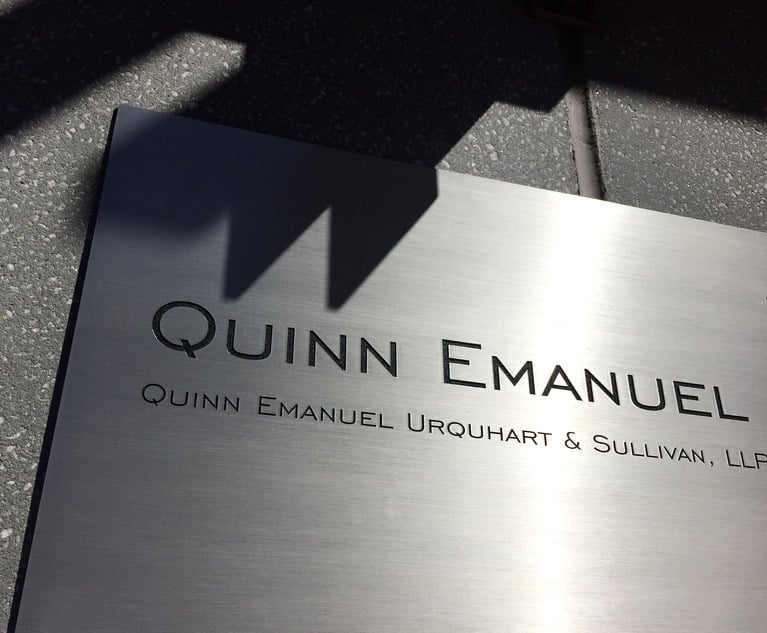Big Four Audit Split 'Would Spark Major Legal Market Assault'
Market executives believe audit separations would remove the independence issues and restrictions currently faced by the accountancy giants.
May 03, 2019 at 04:26 AM
4 minute read
A separation of the Big Four's audit functions into separate businesses would dramatically speed up their expansion into the legal services market, according to various market executives.
Following the surge of MPs calling for an industry overhaul of the Big Four in the wake of scandals such as BHS and Carillion, the Competition and Markets Authority (CMA) last month (April 2019) published recommendations for an audit separation. Ernst & Young, Deloitte, KPMG and PriceWaterhouseCoopers could now be forced to hive off their audit function into separate entities, to reduce their market dominance
Since then, the Big Four have published statements saying they welcome the discussions, but have no plans as yet to split their operations, with some firms criticising parts of the CMA's suggestions.
EY is now taking seeking to challenge the competition watchdog's bid, bringing in Slaughter and May for advice.
If splits do occur it would have a dramatic effect on the Big Four's legal arms, market participants believe.
Mark Vorsatz, chief executive of consultants Andersen Global, believes the change would result in a major push by the Big Four, which he describes as "sleeping giants".
He said that up until this point, the Big Four's legal arms have faced limitations due to conflicts of interest from their auditing bodies, but added: "If they truly separate it, they won't have the independence issues or restrictions on scope of practice… and if there's no independence issues, you would see an expansion of legal services, making them more and more just like other law firms."
Vorsatz said his conversations have revealed a new wave of fear among law firms as to how the legal arms may react in the case of audit separation.
Nick Jarret, from law firm consulting company Edge International, said: "The thing about accountancy firms is that they offer a limited range of services. If we look back to the 20th century, they began to take tax advice away from traditional law firms and they've been looking at doing more and more of this. If their audit function is given new restrictions, they'll be even more anxious to diversify their practices."
He said that revenue decline would mean the Big Four would look for other ways to get income: "And this could include all the typical methods, including being more aggressive in their legal function.
"The accountancy firms have the firepower to make a real dent in the market," Jarret said.
Since being granted legal practice licences, the Big Four accounting firms have grown their legal divisions to a combined total of more than 10,500 lawyers in more than 100 countries.
The possibility of expansion represents a real shift in tactics, which law firm competitors are closely eyeing. Eversheds Sutherland co-chief executive officer Lee Ranson said when the Big Four launched, they intended to advise in limited practice areas. He told Legal Week: "Those barriers have been eroded over time and this erosion will now continue even more. I expect they'll start to compete in the M&A [and] transactional spaces if their audits split."
It has not yet been confirmed whether the audit firms will be required to separate or what exactly the nature of the split might be. Currently, the debate is whether it would be a devolved audit arm with far less information-sharing between audit and the rest of the business, or a complete split that would mean the audit functions are an entirely different entity.
But one former Big Four partner doubts an audit split would spark too much of a battle in the legal market, because the accountants' brand would be weakened.
He said: "If the legal arm is freed from the audit practice, then they've got the freedom to compete alongside other law firms alike. But that would also mean they've lost their USP – their strength is that they're embedded within the overall brand. If you separated their legal arms right now and ranked them alongside other law firms, they'd be f*cked."
But Andersen's Vorsatz maintains that while the overall business could face a setback initially, the damage will only lead the legal arms to launch a fresh attack.
He said: "With the resources the Big Four have, if they put in place the financial support to expand then they could expand very rapidly and aggressively.
"If the handcuffs come off, they are not going to hold back."
This content has been archived. It is available through our partners, LexisNexis® and Bloomberg Law.
To view this content, please continue to their sites.
Not a Lexis Subscriber?
Subscribe Now
Not a Bloomberg Law Subscriber?
Subscribe Now
NOT FOR REPRINT
© 2025 ALM Global, LLC, All Rights Reserved. Request academic re-use from www.copyright.com. All other uses, submit a request to [email protected]. For more information visit Asset & Logo Licensing.
You Might Like
View All
X Ordered to Release Data by German Court Amid Election Interference Concerns

Compliance With the EU's AI Act Lags Behind as First Provisions Take Effect

Quinn Emanuel's Hamburg Managing Partner and Four-Lawyer Team Jump to Willkie Farr

Trump ICC Sanctions Condemned as ‘Brazen Attack’ on International Law
Trending Stories
- 1ACC CLO Survey Waves Warning Flags for Boards
- 2States Accuse Trump of Thwarting Court's Funding Restoration Order
- 3Microsoft Becomes Latest Tech Company to Face Claims of Stealing Marketing Commissions From Influencers
- 4Coral Gables Attorney Busted for Stalking Lawyer
- 5Trump's DOJ Delays Releasing Jan. 6 FBI Agents List Under Consent Order
Who Got The Work
J. Brugh Lower of Gibbons has entered an appearance for industrial equipment supplier Devco Corporation in a pending trademark infringement lawsuit. The suit, accusing the defendant of selling knock-off Graco products, was filed Dec. 18 in New Jersey District Court by Rivkin Radler on behalf of Graco Inc. and Graco Minnesota. The case, assigned to U.S. District Judge Zahid N. Quraishi, is 3:24-cv-11294, Graco Inc. et al v. Devco Corporation.
Who Got The Work
Rebecca Maller-Stein and Kent A. Yalowitz of Arnold & Porter Kaye Scholer have entered their appearances for Hanaco Venture Capital and its executives, Lior Prosor and David Frankel, in a pending securities lawsuit. The action, filed on Dec. 24 in New York Southern District Court by Zell, Aron & Co. on behalf of Goldeneye Advisors, accuses the defendants of negligently and fraudulently managing the plaintiff's $1 million investment. The case, assigned to U.S. District Judge Vernon S. Broderick, is 1:24-cv-09918, Goldeneye Advisors, LLC v. Hanaco Venture Capital, Ltd. et al.
Who Got The Work
Attorneys from A&O Shearman has stepped in as defense counsel for Toronto-Dominion Bank and other defendants in a pending securities class action. The suit, filed Dec. 11 in New York Southern District Court by Bleichmar Fonti & Auld, accuses the defendants of concealing the bank's 'pervasive' deficiencies in regards to its compliance with the Bank Secrecy Act and the quality of its anti-money laundering controls. The case, assigned to U.S. District Judge Arun Subramanian, is 1:24-cv-09445, Gonzalez v. The Toronto-Dominion Bank et al.
Who Got The Work
Crown Castle International, a Pennsylvania company providing shared communications infrastructure, has turned to Luke D. Wolf of Gordon Rees Scully Mansukhani to fend off a pending breach-of-contract lawsuit. The court action, filed Nov. 25 in Michigan Eastern District Court by Hooper Hathaway PC on behalf of The Town Residences LLC, accuses Crown Castle of failing to transfer approximately $30,000 in utility payments from T-Mobile in breach of a roof-top lease and assignment agreement. The case, assigned to U.S. District Judge Susan K. Declercq, is 2:24-cv-13131, The Town Residences LLC v. T-Mobile US, Inc. et al.
Who Got The Work
Wilfred P. Coronato and Daniel M. Schwartz of McCarter & English have stepped in as defense counsel to Electrolux Home Products Inc. in a pending product liability lawsuit. The court action, filed Nov. 26 in New York Eastern District Court by Poulos Lopiccolo PC and Nagel Rice LLP on behalf of David Stern, alleges that the defendant's refrigerators’ drawers and shelving repeatedly break and fall apart within months after purchase. The case, assigned to U.S. District Judge Joan M. Azrack, is 2:24-cv-08204, Stern v. Electrolux Home Products, Inc.
Featured Firms
Law Offices of Gary Martin Hays & Associates, P.C.
(470) 294-1674
Law Offices of Mark E. Salomone
(857) 444-6468
Smith & Hassler
(713) 739-1250









